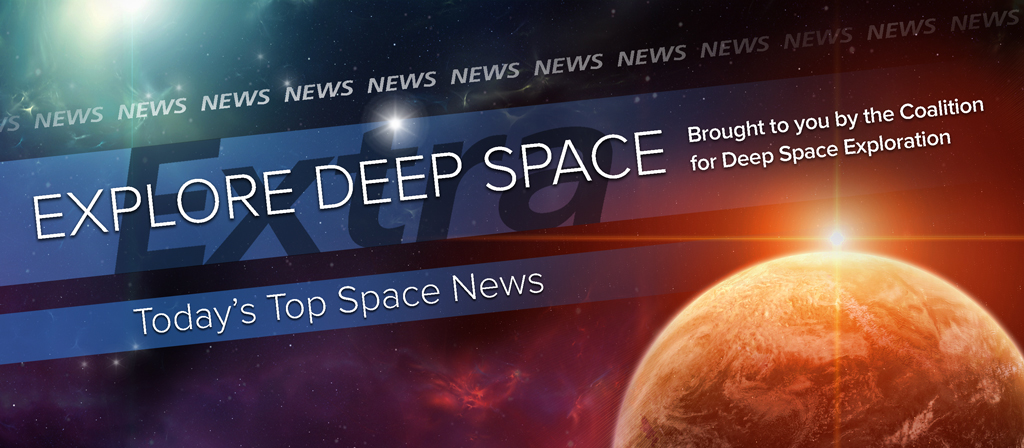In Today’s Deep Space Extra… Strides by NASA astronauts and space hardware are bringing a mission to Mars within reach.
Human Deep Space Exploration
Houston, we have an opportunity…it’s called Mars
Denver Post (3/8): A just-ended 340-day mission to the International Space Station by NASA astronaut Scott Kelly and Russian cosmonaut Mikhail Kornienko is helping to set the stage for humanity’s first interplanetary voyage, a mission to Mars. NASA’s Space Launch System exploration rocket and Orion crew capsule, when combined with the medical information provided by Kelly and Kornienko during their long flight, will help pave the way, according to an op-ed from U.S. congressmen Lamar Smith and Ed Perlmutter. “This is a goal that is within reach of NASA’s technological capability,” write Smith, who chairs the U.S. House Science, Space and Technology Committee, and Perlmutter, a committee member.
Space Science
NASA pressing ahead with studies of a Europa lander
Space News (3/8): Though funding is a challenge, NASA’s Jet Propulsion Laboratory is pressing ahead with a planetary science mission to Jupiter’s ice- and ocean-covered moon Europa with both an orbiter and a lander. Europa may host a habitable environment and the joint orbiter/lander strategy favored by some in Congress would seek evidence of biological activity.
Slippery asteroid surprises scientists with early Earth flyby
Space.com (3/8): Near-Earth asteroid 2013 TX68 flew past the Earth early Monday, a day sooner than predicted. Estimated at 56 to 177 feet in width, the asteroid passed safely at a distance of more than 2.5 million miles, according to the Minor Planet Center in Cambridge, Mass.
Dinosaur killer Chicxulub Crater to be drilled for first time
Universe Today (3/8): The crater near Mexico’s Yucatan Peninsula is believed to be the remains of a large asteroid impact 66 million years ago that extinguished the dinosaurs and 50 percent of other species. The blast deposited a global layer of iridium. Scientists plan to drill into the site to seek evidence for what followed the impact. Researchers from the University of Texas and the National University of Mexico plan to begin in April.
Low Earth Orbit
China plans space telescope that will dock with their Space Station
Universe Today (3/8): China’s planned space observatory would exceed the Hubble Space Telescope in observing prowess. In order to make repairs or install upgrades, the space telescope would dock with China’s planned Tiangong-2 space station.
Commercial to Low Earth Orbit
Blue Origin plans growth spurt this year
Space News (2/8): Near Seattle, Blue Origin prepares for the future, including a ground breaking for a new launch vehicle production factory in Central Florida that could be ready for its first launches in 2019 and more test flights of the reusable New Shepard suborbital rocket. The company is also forging ahead with plans to develop a powerful new rocket engine, the BE-4, as a replacement for imports of Russia’s RD-180 rocket engine. Founder Jeff Bezos, who led a press tour of the company on Tuesday, said Blue Origin plans to expand its workforce as well as its engineering and manufacturing facilities in the Seattle suburb of Kent.
Treasury isn’t moving to sanction Russian rocket-engine maker
Bloomberg.com (3/7): U.S. Treasury Department’s Office of Foreign Assets Control rules against sanctions that would halt imports of Russia’s RD-180 rocket engine altogether. The determination adds to a dispute between some in Congress over the purchases of the rocket engines to launch U.S. national security payloads on the United Launch Alliance Atlas V rocket. In the meantime, the U.S. Air Force is leading the development of domestic alternatives over the next several years.
Photos: Cygnus packed up and fueled for trip to the Space Station
Spaceflightnow.com (3/8): Orbital ATK is preparing its fifth NASA-contracted Commercial Resupply Services mission to the International Space Station. Slated for a March 22 liftoff, the spacecraft named for NASA astronaut Rick Husband, who commanded the final flight of the shuttle Columbia, will carry more than 7,700 pounds of supplies and equipment. The mission will be launched on a United Launch Alliance Atlas V rocket from Cape Canaveral Air Force Station, Fla.
Suborbital
Russia just broke into a business that American billionaires currently dominate
Business Insider (3/8): Kosmos Kurs, a Russian aerospace company, will pursue the development of a reusable rocket capable of flying paying passengers into suborbital space for $200,000 to $250,000. The potential competitor to the U.S. companies Blue Origin and Virgin Galactic plans to begin launching in 2020.
Bezos’ space company aims for passenger flights in 2018
Reuters (3/8): Blue Origin founder Jeff Bezos says the company plans to begin crewed flights of its reusable New Shepard rocket next year, with launchings of paying customers to follow in 2018 — if the testing is successful. Bezos offered the timetable during a tour of the company’s Kent, Wash., headquarters for news media on Tuesday.

